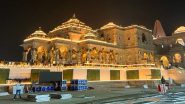Copenhagen [Denmark], October 14 (ANI): In a recent discussion about Pashtun identity and the challenges faced by the community, Levsa Bayankhail, Convener of the Pashtun Security Dialogue at the Indic Researchers Forum and Secretary General of Pashtun Tahafuz Movement, Denmark, emphasized the vital role of the Pashtun National Jirga in tackling these issues.
Speaking to ANI, Bayankhail highlighted the crucial role of the Pashtun National Jirga in forming and preserving Pashtun identity amidst ongoing challenges. She stated, "The Pashtun National Jirga holds significant historical importance in shaping Pashtun identity, particularly in the face of longstanding challenges posed by Pakistan's establishment and foreign powers. For decades, Pashtun society has been subjected to proxy wars, terrorism, and internal disunity, with the Pakistani state manipulating some Pashtun leaders and Islamic scholars to serve geopolitical interests. This has allowed Pakistan to profit from foreign funds and military assistance, all at the cost of Pashtun blood, resources, and land. As a result, Pashtuns have faced devastating consequences, including human rights abuses, enforced disappearances, extrajudicial killings, and profiling."
Highlighting the growing divide among Pashtuns on either side of the Durand Line, Bayankhail stated, "The disconnection between Pashtuns on both sides of the Durand Line has deepened, preventing a collective response to shared suffering. Pakistan's engineered education and history books, along with extreme interpretations of Islam, have further divided Pashtuns by promoting jihad and proxy wars in their regions, especially in Afghanistan."
In response to atrocities reported against Pashtun communities by the Pakistani armed forces, Bayankhail remarked that the Pashtun National Jirga has taken a strong stance.
Also Read | Lok Sabha Speaker Om Birla Set To Address 149th Inter-Parliamentary Union in Geneva.
She said, "The Pashtun National Jirga has strongly responded to reported atrocities committed by the Pakistani armed forces against Pashtun communities. PTM activists and ordinary Pashtuns gathered in large numbers in Khyber to prepare for the Jirga, initially demonstrating peacefully. However, when the Peshawar police fired on them and used tear gas, the protesters resisted by gathering in larger numbers and throwing stones. Demonstrations also spread to Pakhtunkhwa, the EU, and the US, with activists contacting NGOs and authorities abroad."
Looking ahead, Bayankhail outlined the Jirga's approach to future strategies, emphasizing collective decision-making. She said, "The Jirga envisions future strategies that will emerge through collective decision-making, as it brings together Pashtuns from various political parties and backgrounds. Since no single individual holds an authoritative role in the Jirga, every participant's opinion is valued equally. The Pashtun Tahafuz Movement (PTM), as a human rights movement representing Pashtuns across the Durand Line and worldwide, will present its opinion based on the presented data to the Jirga. The outcome of the Jirga will depend on the input from all representatives, including political, religious, and tribal leaders, as well as community members."
Bayankhail also highlighted Manzoor Pashteen's commitment to peaceful protests and dialogue, which have defined the movement's objectives.
She said, "Manzoor Pashteen's leadership within the Pashtun Tahafuz Movement (PTM) has significantly shaped the movement's objectives and strategies. His focus on peaceful protests and dialogue has emphasized non-violent resistance, distinguishing PTM from more militant approaches. Pashteen has effectively mobilized Pashtuns by advocating for human rights, self-determination, and accountability for state-sponsored violence. Under his guidance, PTM has prioritized grassroots activism, empowering ordinary Pashtuns to raise awareness of their struggles and mobilize support."
Discussing the ban on PTM, she noted that this action by the Pakistani state has galvanised support among Pashtuns. She said, "The Pashtun Tahafuz Movement (PTM) gained international attention and increased support among Pashtuns after its ban by the Pakistani state. This action led many Pashtuns to react strongly, recognizing the brutal political agenda against their community. Those who were previously pro-Pakistani state began to question whether they could coexist with a Punjab-dominated system that marginalizes their rights. As a result, there has been a growing sense of unity among Pashtuns, with many now advocating for their rights and self-determination."
Bayankhail called for international support, stressing the sacrifices made by Pashtuns in their struggle for justice. She said, "The ongoing repression faced by Pashtuns at the hands of Pakistani authorities highlights the tremendous sacrifices they've endured in their quest for justice. The Pashtun Tahafuz Movement (PTM) has urgently appealed to the international community to address the escalating violence against peaceful assemblies. Human rights organizations and foreign governments are called upon to condemn the Pakistani state's actions and hold it accountable for violating fundamental human rights." (ANI)
(This is an unedited and auto-generated story from Syndicated News feed, LatestLY Staff may not have modified or edited the content body)













 Quickly
Quickly

















